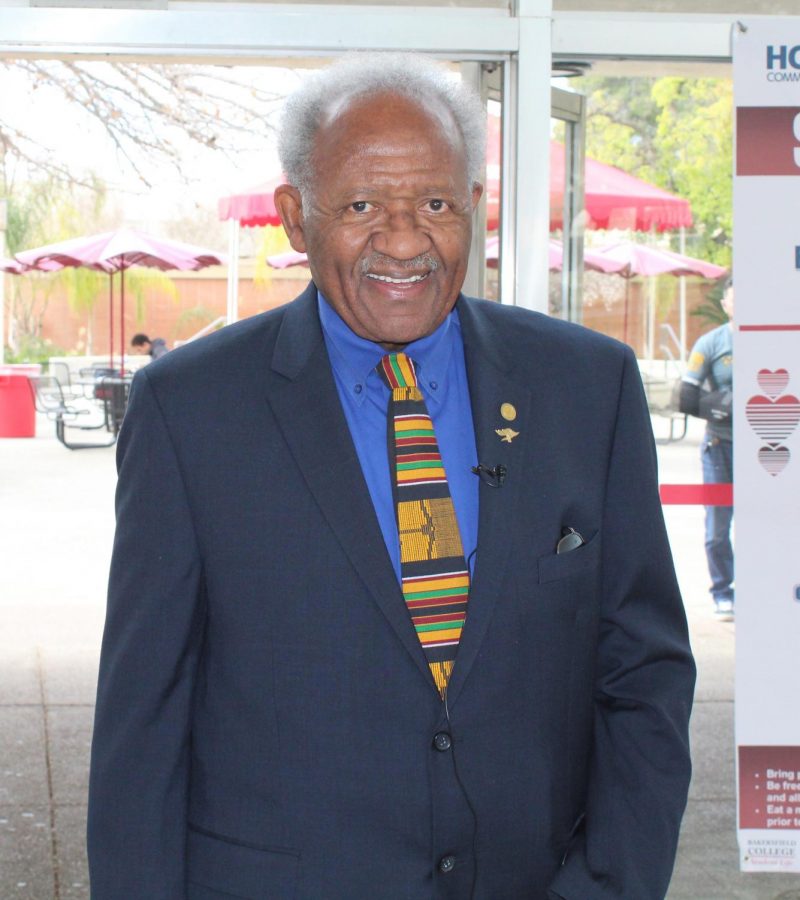Horace Mitchell shares perspective on Black History
CSUB President Horace Mitchell shares his personal Black History during the Brown Bag Discussion at Bakersfield College Feb. 20, 2018.
March 11, 2018
Bakersfield College held a Brown Bag Discussion on Feb. 27, 2018 featuring guest speaker Horace Mitchell, who has been the President of Cal-State University Bakersfield since July 2004. As a accomplished African American with over 50 years of experience in education he was able to provide a perspective on his own personal and academic Black History. Mitchell shared the challenges he faced as a first-generation African American college student.
Steve Watkins, a former CSUB administrator and now the director of outreach, as well as the African American Initiative Committee Chair at Bakersfield College, introduced Horace Mitchell.
This informal speech/discussion focused on the accomplishments of Mitchell in the face of various adversities. He briefly touched on his experiences during his 50 years in education, from being a college student and administrational professional.
In many circumstances he was the first African American to step into certain administrative positions. He referenced certain experiences where individuals who were stereotypical in their assertions, when recognizing his authority and status in these administrative roles, for at the time these positions were still socially recognized as being held by affluent white males.
Mitchell shared a story about living in a small town named Clarksdale, Mississippi and that violent racial attacks on Black Americans forced his family to move away. “From my first 10 years are so I lived in a small segregated town in Mississippi okay, and a lot of things were happening at that point and time. The major event that caused my family to decide to move from Clarksdale Mississippi to Saint Louis, sort of as a last straw, was the lynching of a 14-year-old black man named Emmett Till. Okay and this was a very common thing in the South. Somebody said that he (Emmett Till) made a pass at a white girl.” This story held the audience’s attention closely.
Mitchell went on to discuss informally about how his principle at his high school was apprehensive about supporting his desire to attend Washington University in Saint Louis, Missouri. Instead the principle encouraged Mitchell to attend Monmouth College in Illinois. His principle at the time referred to Mitchell as, “a big fish in a small pond” and he expressed his reasoning why Mitchell was not prepared to attend Washington University.
Horace Mitchell acquired his PHD and became the first African Vice-Chancellor at the University of California Irvin.
A Bakersfield College student asked Mitchell, “What is your opinion on the organization identified as Black Lives Matter movement?” And do you view it as a negative agency? His response reflected that he supported the concept in which the organization was founded upon, which is to bring awareness about the number of Black American deaths that were occurring at the hands of law enforcement agencies. He said, “The Black Lives Matter movement is really important” and “The Black Lives Matter Movement came up because many Black lives were taken (killed) by police and it seemed as if Black lives didn’t matter.” He referred back to what he had lived through as a child in the “South” and added that the intended message from BML is that Black Lives Matters also, because he had experienced black lives not mattering.
Julian West, who is an advisor at Bakersfield College, was in attendance at the Brown Bag Discussion spoke to the impact Mitchell’s words had on him. West said, “I found it inspirational as well, that he was able to break those grounds.” And “He was the first in many circumstances and If you ask me what Black History is…Horace Mitchell fits right in, because my definition of Black History is perseverance to endure and overcome an induced failure. If you look at history we been through slavery, segregation, Jim Crow Laws and we live in a city where the Police Chief in Bakersfield in 1920 was a registered member of the Klu Klux Klan. Yet we look at today and we have an African American Police Chief and Horace Mitchell became the First Black President of a CSUB”. Mr. West said, “Our history is about overcoming failure, it’s in our ancestry.”
The students, faculty and staff gave a standing ovation for President Horace Mitchell as he ended the discussion showing appreciation for his 50-year dedication to education and the history he shared about the era of Emmett Till to becoming a soon-to-be-retired president of CSUB.






